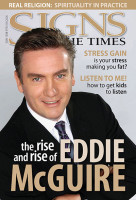Some people get more then their fair share of lemons in life. Christine Miles explores the attitude of a lemonade salesman.
He's one of New Zealand's most sought-after inspirational speakers, and listed in the top six inspirational speakers in Australia. He's a qualified surf lifeguard and champion swimmer, with a second-degree black belt in taekwando.
He's a speedway and racing- car champion, a gold medal–winning athlete at world level, and a qualified pilot.
He's a successful businessman, a husband and father of three. And he has no legs.
In the winter of 1967, when Tony Christiansen was nearly nine, he and his friend Gary went with Gary's father to bag coal at the Tauranga, NZ, railway shunting yard. Gary's father was a member of the local branch of the Lion's Club—a non-profit group that fundraised for projects within the community. Two wagons of coal had been donated to the Lions. The boys were going to help bag the coal in preparation for distribution.
“Gary and I were to get the empty sacks off the truck, take them to the coal wagons, then hold them while the dads shovelled in the coal,” Tony says. “The bigger men would carry the full sacks back to the truck. It was early, and Gary and I went for a wander—a train yard is an exciting place for two young adventurers. When we came back Gary's dad was very angry with us because we'd disappeared in such a dangerous place, so we were told to go and get some more empty sacks. We walked behind the wagons, got some more sacks and then decided to go the short-cut way back, behind a bulldozer-carrying flatbed. We began to cross the track, with me closest to the flatbed.” As Tony went behind the train, it shunted for no apparent reason—with the engine, wagons and flatbed moving back about two metres.
As the train went back, the flatbed hit Tony on the left shoulder, dragging him under.
“There were dual sets of wheels on the flat deck and they both ran over my legs,” Tony says. “I was lying on the track, my legs nearly severed. I would have died within a few minutes because of blood loss, but the wagon's sharp, steel wheels actually crushed the arteries in my legs, cauterising them, so all my blood didn't pump away.” It was an accident he shouldn't have survived.
But not only did he survive, he's lived a life filled with achievement. A big part of his success is his attitude to life.
“We live in a world,” Tony says, “where we're told that if you're not a winner, you're a loser. If you're not a success, you're a failure. We're given examples of this every day of our lives. We see it on the television and read it in the newspapers."
“I don't believe that at all. It's not about winning or losing; it's about how you play the game. It's about being the best you can be.”
Playing the game has meant that Tony has had to be adaptable to his environs.
Several weeks after the accident, when he was allowed home from hospital on weekend leave, while everyone was outside, Tony realised that he didn't want to be on his own.
“I wanted to be with everyone else,” he says. “So I started rolling around the floor and the next thing I was rolling down the hallway. I just rolled over and over on my side to get from place to place. I thought, This is pretty cool—until I hit my head against the wall. There had to be an easier way to get around.So I sat up and started to rock and move forward, but soon fell down because my arms weren't very strong."
“From that day I realised there was a way for me to get about independently. I just needed to work on it and strengthen my arms. So I learned how to slide around a little bit and get from one point to another. I soon mastered the technique and got faster and faster. I was so fast that I could move quicker than some people could run.” Two people in particular changed Tony's life and gave the nine-year-old focus.
Tauranga swimming coaches Dave Franklin and Allan Guthrie had read an article that recommended swimming as a great form of physiotherapy for disabled people. “So around to the house came Dave and Allan with the idea in their heads that physical exercise was something I needed, and that swimming would be the perfect answer. The only problem was, I hated water; I couldn't swim before the accident and now I didn't have any legs!” One Friday afternoon his mother took him to the public pool for the first of his swimming lessons with Dave and Allan.
He sat on the edge of the learners pool, which to the average kid was chest deep, but was over Tony's head. He tried every excuse in the book not to go ahead with the lesson. But Dave and Allan were determined.
They grabbed an arm each and threw him in. They were using the trusted “sink-or-swim” method. And Tony sank.
He says he remembers looking up from the bottom of the pool and thinking, This isn't good.
Tony reckons he went under three times, each time being scooped out with a net used for skimming leaves off the water.
“There was no ‘Oh, you poor boy, you've lost your legs'—not from Allan and Dave,” says Tony. “Instead, it was, ‘We're teaching you how to swim and here we go.' It was a bit of a characterbuilding exercise for me.” Allan Guthrie was a big man but also a very gentle man—he always gave Tony the impression of having a gruff exterior, but he was soft-hearted. Allan jumped into the learners pool, with his trousers still on, picked Tony up from the side of the pool and plonked him back in. Then he started dragging Tony around the pool so he could become accustomed to the water and learn to float with assistance."
“From that day on I became really passionate about things,” says Tony. “Looking back, it was a major step, something that changed my life, and I have those two men to thank for it. It's so easy to sit there and think, I can't do that; I'll never do that. Dave and Allan taught me an important lesson about coping with my disability—I had to get out there and just do it."
“Sure, I had a setback when I was nine. But that didn't stop me getting out there and trying my hardest to make a difference. Before the accident I could have done 10,000 things, but after the accident I could only do 8000 of those things. And that's the way we should look at life—it's full of possibilities.” One of Tony's favourite pastimes is four-wheel motorbike riding. Having no legs means he isn't especially secure on the bike—but for Tony, the added challenge increases his enjoyment of the sport. One incident stands out.
“A group of mates and I were riding on a local track and I was having a great time, speeding around and getting covered in dirt,” says Tony. “We came around a corner and there was a huge boggy hole in front of us. Trees lined either side, so there was nowhere to go except straight through the mud. Being big and brave, I volunteered to go first."
“I hit the bog at great speed, the bike stopped and I kept going—straight over the handlebars. I was sitting in mud up to my waist and my mates were having a huge laugh. I said to them, ‘Come on, guys, give me a hand to push this bike out.' As we started to push the bike out, another group of riders came around the corner and stopped. We told them to drive around us and they'd be fine, but instead they took off and went flying into a ditch. I said, ‘You wallies, what did you do that for?' “They looked at us and pointed to me and said, ‘You're having us on, look how deep it is where he is.' “I climbed out of the mud and went to the side. The looks on their faces—they couldn't believe it. I jumped on my bike and took off, and when I came back an hour later they were still sitting there staring at the mud.
“People want to know my story—they want to know how I lost my legs,” says Tony. “When companies hire me, they want to know my credibility, my success in business and what I'm going to talk about. When I speak, not only do I tell my story but I also try to tell the audience things they may not want to hear— things that make them question their life and achievements. But I'm not trying to motivate anyone. That word motivation is a tough one. I don't like to think that I'm a ‘motivational' speaker; I'm an inspirational speaker. I'm really telling a story and hoping that listeners will be inspired enough by it to make a difference or make a change in their lives. Who knows the right or wrong way to live? I believe that our lives aren't scripted. I believe we can do anything we want. We just have to want to do it badly enough. We all have choices. We all have challenges in our lives—it's how we deal with them that matters. And I like to make challenges.” Tony talks about adversity; how it makes you a better person, that a tragedy or a challenge in our life makes us dig down deep and brings out the best in us.
“So why,” he asks, “are most of us sitting around waiting for something to happen before we go out and be the best we can be? “Life isn't about winning or losing,” Tony says. “It's about being the best you can be. We all have the potential in our life to achieve greatness. We just have to believe in ourselves. Believe who we are, believe what we stand for in our life. And this belief comes from having an attitude.”





